In order to further develop the country, Laos, whose economy is largely dependent on the export of hydro-electric power and natural resources, is turning towards small and medium-sized enterprises and the training of business personnel as a way to foster economic growth. The Laos-Japan Human Resource Development Institute (LJI) provides Japanese business know-how as a way of supporting Laos to achieve this goal.
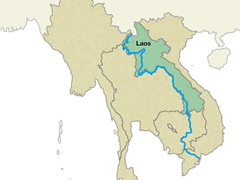
Supporting the Market-Oriented Economic Reforms by Training and Developing Business Personnel
In the latter half of the 1980s, Laos started its transition from a planned economy to a market economy. Allowing civilians to freely engage in competition will grow the market economy, but first people need to see themselves as the core of the economy and feel they have the ability to act. Therefore, in 2001, in order to foster personnel who support the market economy, JICA established the Laos-Japan Human Resource Development Institute [1] (LJI). As a pioneer in the training and development of Laotian business personnel, the institute continues to produce many exemplary graduates to this day.
The LJI has a wide variety of courses ranging in length from short-term intensive courses lasting for several days, to courses that last up to two years. Among these are the Practical Business Course, which teaches Japanese-style management theory and practice, and the Management School, a course where Japanese lecturers experienced in manufacturing in Japan teach management strategy and marketing. Thus far, over 17,000 students have received training.
Applying Acquired Knowledge to Create a Thriving Business
Sifrong Thavixay, who has attended about 30 business courses, says, "Although theory and knowledge are important, the thing I found most useful has been various approaches to problem solving found throughout the curriculum." She is currently engaged in a number of businesses, including a sewing business and a café, all of which are very different from her university major of political science. She maintains that the knowledge she now has, about management and production control, was mostly gained through the LJI. "The approach of breaking down problems - which at a glance seem impossible to solve - into smaller problems and finding solutions to those problems was something that was new to me. Students were always impressed by the fact that the teachers had vast practical experience. Whenever we'd ask them something, they would always have a specific answer, and provide appropriate advice based on their own experience."

The cost of the MBA course is about JPY 360,000. Although this is by no means cheap by Lao standards, where the average annual income is around JPY 90,000, participants are very enthusiastic and consider course fees as an investment in their future.
Ms. Thavixay is now planning to start up a garbage collection service. In Laos, many entrepreneurs struggle to secure funding because they do not know how to do things like draw up a business plan. Ms. Thavixay has no such problem, and her new venture is proceeding smoothly as she puts the knowledge she acquired at the Management School into practice. She says that what prompted her venturing into a new field of business totally unrelated to sewing is also thanks to the LJI.
"In group discussions, as we considered the various business proposals fellow students had created, I came to realize that there are many business possibilities in Laos. One of the reasons that I attend so many courses is to glean new knowledge from my peers. Submitting business problems and new ideas as topics to be discussed by everyone provides me with solutions I would never have considered. It also lets me see any blind spots. Rather than debating, it is more like consulting," says Ms. Thavixay with a smile. She has learned a thing or two already.
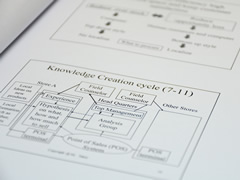
The MBA course textbooks prepared by Japanese specialists
There are also graduates who are using the knowledge gained from their MBA course to streamline management operations. Ms. Lamai Keosavang, who works in their family business, Jmart supermarket, tells of the challenges she faced upon joining the store. "Previously, there was no inventory management detailing what was purchased from where for what price, and how many were left and where they were stored, so running out of products and having an excess was a daily occurrence. Everything was like that. No thought was given to objectively looking at the state of management or making improvements."
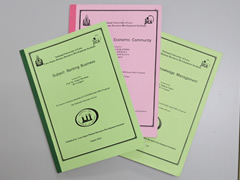
The MBA course textbooks prepared by Japanese specialists
Ms. Keosavang struggled to break free from a management style that had remained unchanged for years. One area in which she achieved a major success was personnel management. "My mother was an old-school manager. She told employees what to do in great detail. The trouble with that is you don't have enough time left to do the things that are important to do as a manager. I started by talking with employees and taught them the Japanese concept of kaizen [2] in order to help them become aware that they too are stakeholders. Now I can leave the day-to-day running of the store to the person in charge," she narrates. Giving employees the freedom to use their discretion increased their motivation. Sales performance is steadily improving, and in the near future she plans to open another store.
The Growing Ties Between Laos and Japan
The LJI also links trained Lao business personnel with Japanese businesses. More than 140 Japanese companies have already entered into Laos. Mr. Bounlouane Douangngeune, the director of the institute, says, "The number of Japanese companies visiting the institute in recent years has been increasing, so I think we can expect increased investment in the country." Even now, the institute offers a range of services, such as providing information about the state of infrastructure and security, as well as identifying Lao companies that could potentially partner with Japanese companies. They can also help in the search for qualified personnel fluent in Japanese. Mr. Douangngeune says that more emphasis will be placed on such efforts, and that they will continue to support the creation of networks between Japanese and Lao companies.
The average age of the population in Laos is 22 years. The heightened desire for growth of these young people is driving the development of the nation. Speaking of the future, Mr. Douangngeune says, "The transition to a market economy is progressing, and in the last 10 years the number of students aiming to become entrepreneurs has increased by approximately 10 percent. Consequently, expectations for the institute will be heightened, so we plan to grow in such a way that we will be able to meet them."
Notes
- [1]The Laos-Japan Human Resource Development Center was established in 2001. It was incorporated into the National University of Laos as the Laos-Japan Human Resource Development Institute in 2010.
- [2]Characterized by the ongoing review of processes in the workplace and the formulation of solutions emanating from the workers.
Mr. Bounlouane Douangngeune
Laos-Japan Institute Director
Graduated from university in Australia in 1998. Joined the Laos Ministry of Agriculture and Forestry and became involved in regional development projects supported by Japan. Began studying in Japan at the National Graduate Institute for Policy Studies (GRIPS) in 2000 and earned a PhD degree in International Development Studies. Has been working at LJI since 2005.
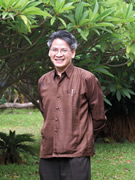
Ms. Lamai Keosavang
MBA Course, Batch 4

The "J" in the name of our store stands for the first name of my elder brother, and also for Japan, to which we owe so much.
"I studied management at a university in Japan so that I could help the family business, but after I actually started working I quickly realized that I didn't know enough and so enrolled in the MBA course. The experience I gleaned as a part-time worker in Japan in terms of employee management also comes in handy. It's unusual to find private businesses in Laos following the standard practices, such as working in shifts and issuing pay slips, that we have implemented."
Ms. Keosavang after Graduation

At Jmart, the Japanese 5S methodology is implemented in order to improve the workplace environment.
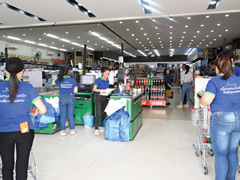
A workplace managed by a leader. New workers at Jmart are always surprised at the way in which work is carried out.
Ms. Sifrong Thavixay
MBA Course, Batch 5 / Management School, Batch 1

We make products for the Japanese market, too.
"Around the time I was working in sales for a print shop, I was asked by a client to print some shirts for promotional use. That was the beginning of the sewing business. When I looked into it, I found that even though there were companies that accepted orders from overseas, there were almost none that accepted orders from within Laos. ‘If no one is going to do it then I'll do it myself,' I thought, and set to work making it happen."
Ms. Thavixay after Graduation

Ms. Thavixay won this trophy in a business plan contest sponsored by the LJI. She was awarded the top prize for her plan for a new apparel brand aimed at the Lao market.
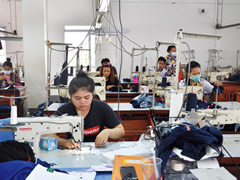
Sewing is based on the division of labor. "Find areas of waste in the process and increase production efficiency."
Student Comments
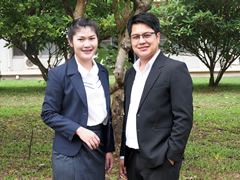
Ms. Vanhnasone Nouphabphavongsy
Works at the Laos Ministry of Industry and Commerce, and enrolled in the MBA course on the advice of a friend.
"When I used the concept of line production and collected each page of output documents into piles, my supervisor was very surprised, and my colleagues adopted the same method. If you deal with situations well, even with the smallest of things, it can influence your colleagues and improve the overall efficiency of the system."
Mr. Khamphanh Keosomphanh
Manager of the Personnel Department at a power company.
"I decided to take the MBA course since it would enable me to acquire a master's degree in business management, and the idea of learning Japanese-style management appealed to me. The day after I learned about kaizen, I reorganized all the documents around my desk. Now my work environment is pleasant, and it is easier to decide what needs to be done first."
Laos-Japan Human Resource Development Institute (LJI)

The LJI is located on the lush grounds of the National University of Laos. In addition to training business personnel, the institute actively encourages Japanese language education and promotes cultural exchange.

On Entrepreneurship Day, graduates of the MBA course set up booths at the venue and showcased products made by their own companies.
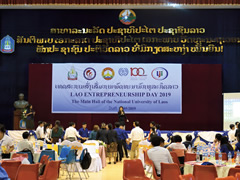
On May 24, 2019, in cooperation with the UN's International Labor Organization, the LJI held an Entrepreneurship Day for learning how to create a business plan.




scroll